
Bridging the Generation Gap
Technology’s Transformative Role in Shaping the Parking Workforce
Share:
Share:

E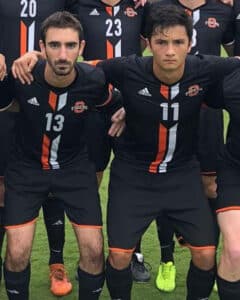
Today, as co-founders of Ocra, the first centralized channel management platform for parking operators, they’re at the helm of parking’s new guard: young innovators “upskilling” the industry by combining their own experiences with the institutional knowledge they’ve gained from mentors and experts who have been leading our industry for decades.
In their own words, here’s Ethan, Chief Executive Officer, and Nate, Chief Operating Officer, on how they went from feeling the pain of technology fragmentation firsthand to building the team and software that solves it.
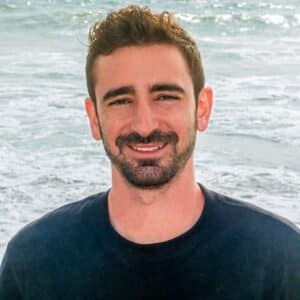
The company that would become Ocra was born when I was directing a bootcamp for student entrepreneurs and we were challenged to find a problem to solve through innovation and technology. For us, that problem ended up being the notoriously difficult parking situation around the LA Coliseum.
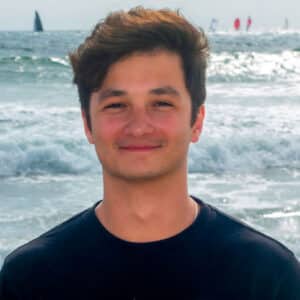
Ethan likes to say that working together on the company early on made us better teammates on and off the field, which I agree with, even though it sounds a little cheesy. We shared a vision for the business and committed to it.
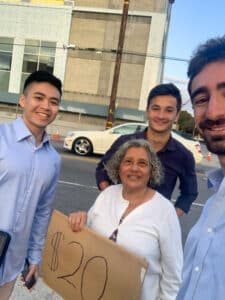
Originally we were thinking that we’d build a consumer parking marketplace, but we quickly discovered that competing with the larger players wasn’t the future of our company. We were hungry to make it work, however, and unwilling to give up. So when we uncovered the opportunity to arbitrage parking spots as day-lease operators, we pivoted and went all in.
Nate: Becoming event parking operators was the first of several transformative moments for us. It’s where we started to build the approach and philosophy central to Ocra: understand the problem and learn how to solve it for exactly who it is we’re serving. That’s still our ethos today.
Ethan: Our eyes opened immensely as operators. We were handling just a sliver of the complexities involved in running a parking operation: everything from staffing attendants to setting rates, managing inventory, and preventing slippage. Getting this experience, for us, was invaluable.
Soon we started selling inventory online through consumer parking apps and realized that we could double revenue while mitigating the risk of arbitrage (story for another time).
Nate: The genesis of the product is that we started using as many channels as possible to drive revenue and optimize yield. But it didn’t take too long before we couldn’t ignore the operational inefficiencies of managing multiple demand channels every day, day in and day out.
We wanted to increase our margins and scale the operation but issues like overselling inventory and tasks like manually reconciling reports were getting in the way. We needed reliable software that made multi-channel management more efficient, but it didn’t exist. Yet.
Ethan: Fortunately, we had the right team to build what we needed: an internal tool that centralized the management of rates and inventory across all of our consumer demand channels. Finally, we weren’t burning time and manpower to log into each individual seller console daily to do our tasks. Internally we called this tool “OCRA”: One Click Rate Adjustment.
One of the leaders of this team was our Occidental classmate, Leo Connelly. Leo is a founding member who has been instrumental since our event parking operator days, when he experienced those challenges along with us. Today he is Ocra’s Technical Project Manager and a cornerstone member of our engineering team.
Nate: Then COVID-19 hit. Events shut down pretty much overnight. This was our next inflection point: do we give up, or do we see if the centralized demand channel management tool that we built for ourselves has meaningful applications for other parking operators? We decided to find out.
The next step was assessing product market fit for “OCRA”. It wasn’t enough just to experience the problem of technological fragmentation ourselves; we needed to validate it.
We went about doing this by messaging more than 3,000 parking leaders on LinkedIn and asking if they were open to talking about the challenges they were facing during the COVID-19 lockdown (other than nobody driving) and what their plans were for implementing new technology moving forward.
Ethan: The industry welcomed these conversations with open arms and illuminated the path forward for us. We heard ubiquitously that fragmentation is the root of many of the costliest operational problems in parking today. We had experienced this, too, so the next step was for us to fully understand the problem from all angles (Operators, Technology Providers, Asset Owners, etc.). In doing so, we validated that fragmentation was the core problem that we needed to solve.
Nate: If you look at our early product roadmap, you can see the impact that these conversations made on how we determined the critical capabilities of the platform. We prioritized what we built, and informed how we built it, based on these insights.
Many of these people we met on LinkedIn became our mentors and continue to provide feedback and make referrals and recommendations daily. Several of them even went on to join our team: Chris Everton, our Vice President of Product, and Sarah Becherer, our Vice President of Growth.
Ethan: Reading the dissertation written by the great Todd Tucker, it is empirically proven that utilizing consumer demand channels to augment sales for parking assets can have a significant impact on revenue. In his findings, the largest impediment to this value creation is the cost of labor associated with managing the channels. This was troublesome for both the operator side as well as the consumer demand channel side of the marketplace. It started to become clear that our solution could be the rising tide that raised both ships. Unsurprisingly, our beachhead solution to the fragmentation was focused first on integrating with these technologies.
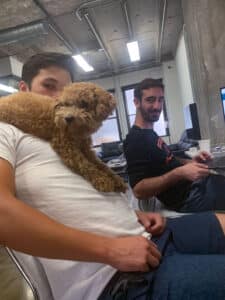
We spent that period building out a robust minimum viable product in collaboration with Ocra’s early adopters. One advantage that we have as a company is being able to move quickly and course-correct, so we can ship new solutions out the door quickly and then iterate and improve as needed.
Ocra Version 2.0 is a full bottom-up re-build of the platform. It was built to scale so that operators can use as many consumer demand channels as they want and still have just one place to log in to manage rates, inventory, blackouts, and reporting for all of them, all at once.
Ethan: Our operator partners mean everything to us. They continue to help us understand what their needs are, where they see opportunities, and how we can best collaborate to build the best solutions. Collaboration is in the Ocra DNA, and we strive to create a culture that where 1+1=3.
We continue to work with operators who are evaluating build, buy, or partner decisions. Being a part of these conversations enable us to ensure that we are building the right software to be a compliment to their tech stacks. One of our core competencies is building integrations which help build bridges and provide operators with more options as a result.
Nate: Our engineers excel at building and maintaining complex integrations that exchange data between systems in just a few seconds. They’re led by our Chief Technology Officer, Garth Boyst, who has 20+ years of experience and previously spent 10 years at Microsoft working on high-priority projects like Windows XP and Bitlocker. The team is really impressive and operators trust us because they know that we’ll deliver.
Ethan: It is a common consensus in the industry that parking is at a technological inflection point. We’re consistently becoming more critical from an operational standpoint to adjacent industries like hospitality, real estate, transportation, and mobility.
Operators have been talking about integrations for the better part of a decade. Facilitating the open flow of data between technologies in our own industry is a prerequisite to unlocking opportunities with adjacent ones.
Nate: Data-wise, we all know that silos are inhibitive. The “one thought vs. another thought” mentality is limiting and detrimental to growth. There is a way to bring the history of parking and all of its evolution into a place where everyone can participate and ask and answer questions and broaden their perspectives. In our experience as a company so far, it hasn’t been difficult to arrive at this place.
Ethan: We’ve been extremely fortunate in this regard. Ocra can credit much of its success to the many industry veterans that continue to generously share their experiences and wisdom.
Young professionals entering parking may be intimidated and have the misconception that these parking leaders with long impressive careers won’t be interested in educating someone new to the industry. We’ve found it to be the opposite. It’s always important to us, however, to approach these relationships with a giving mentality first.
Nate: Ethan and I try to go above and beyond whenever possible. We ask about our partners’ current blockers and pain points. Sometimes their request is related to solving something in the Ocra platform, and sometimes it’s a personal one.
Whatever the situation, we try to help them find solutions. A mentor-mentee relationship shouldn’t be all “give” in one direction, and all “take” in another. It’s important to think about how you can help your mentors, too, even if you have less to give at first.
Ethan: Our recommendation to young entrepreneurs who are looking for mentors is to build your own “personal boardroom” of people who have deep expertise in different areas. This prevents you from overwhelming any one person. It also actively benefits you to surround yourself with a diversity of perspectives and people who will challenge you to grow in different ways.
Nate: The mentorship community is a big part of what makes me excited to be a part of this new generation of parking professionals. There’s a ton of opportunity for growth in any industry that is excited to innovate and can do it, which is where parking is right now.
Companies that are focused on building solutions for operators are well-equipped to tackle the fragmentation problem and change the industry for the better.

Technology’s Transformative Role in Shaping the Parking Workforce

Why Parking Operators Should Remain Technology Agnostic
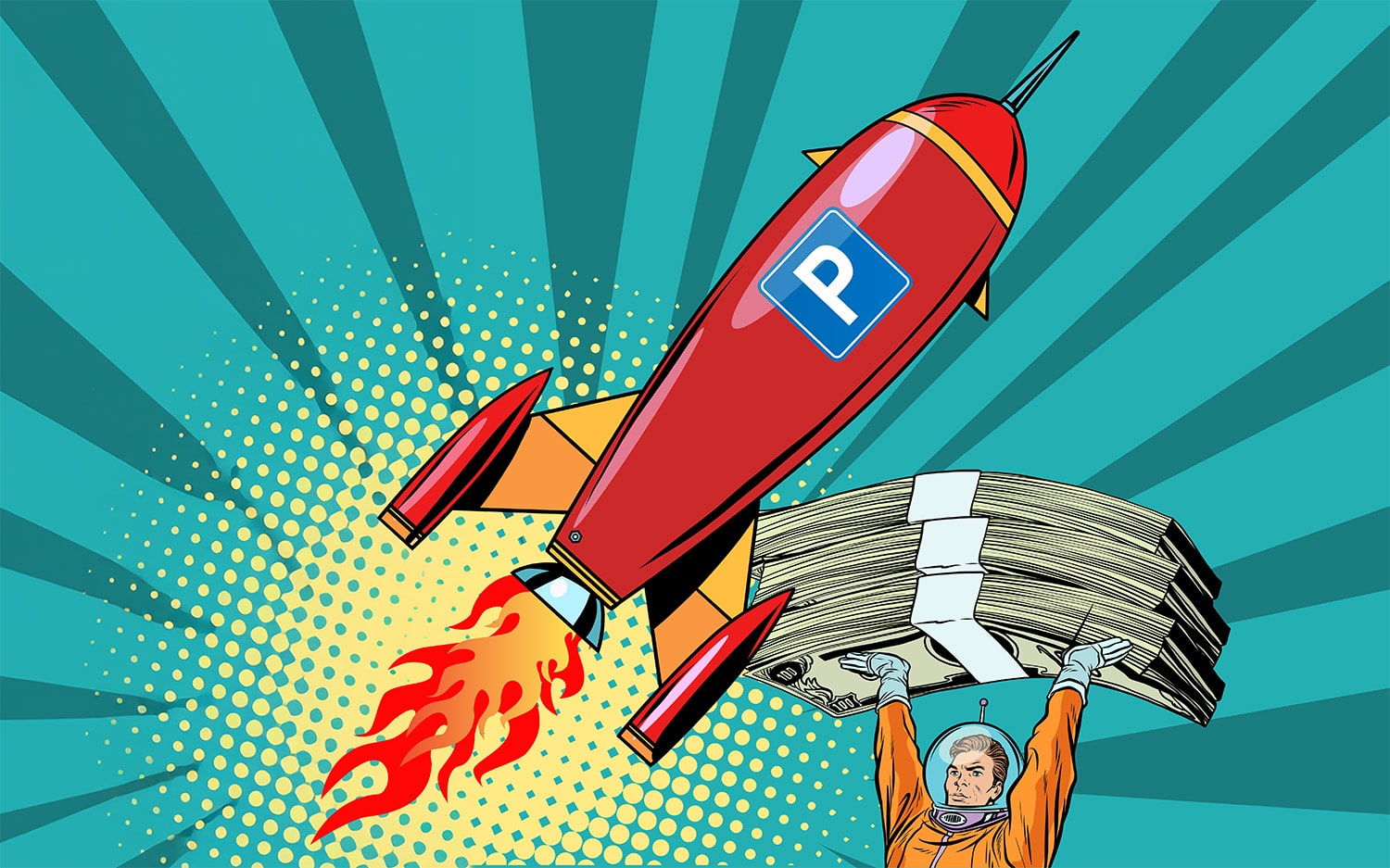
The Role of Investment in Parking’s Future
Parking & Mobility is IPMI’s flagship publication, covering the news, trends, analysis, technologies, and people of the parking and mobility industry, and how it affects and influences communities around the world.
| Cookie | Duration | Description |
|---|---|---|
| cookielawinfo-checkbox-advertisement | 1 year | Set by the GDPR Cookie Consent plugin, this cookie is used to record the user consent for the cookies in the "Advertisement" category . |
| cookielawinfo-checkbox-analytics | 11 months | This cookie is set by GDPR Cookie Consent plugin. The cookie is used to store the user consent for the cookies in the category "Analytics". |
| cookielawinfo-checkbox-functional | 11 months | The cookie is set by GDPR cookie consent to record the user consent for the cookies in the category "Functional". |
| cookielawinfo-checkbox-necessary | 11 months | This cookie is set by GDPR Cookie Consent plugin. The cookies is used to store the user consent for the cookies in the category "Necessary". |
| cookielawinfo-checkbox-others | 11 months | This cookie is set by GDPR Cookie Consent plugin. The cookie is used to store the user consent for the cookies in the category "Other. |
| cookielawinfo-checkbox-performance | 11 months | This cookie is set by GDPR Cookie Consent plugin. The cookie is used to store the user consent for the cookies in the category "Performance". |
| CookieLawInfoConsent | 1 year | Records the default button state of the corresponding category & the status of CCPA. It works only in coordination with the primary cookie. |
| elementor | never | This cookie is used by the website's WordPress theme. It allows the website owner to implement or change the website's content in real-time. |
| viewed_cookie_policy | 11 months | The cookie is set by the GDPR Cookie Consent plugin and is used to store whether or not user has consented to the use of cookies. It does not store any personal data. |
| Cookie | Duration | Description |
|---|---|---|
| _ga | 2 years | The _ga cookie, installed by Google Analytics, calculates visitor, session and campaign data and also keeps track of site usage for the site's analytics report. The cookie stores information anonymously and assigns a randomly generated number to recognize unique visitors. |
| _ga_02PMHW8YWC | 2 years | This cookie is installed by Google Analytics. |
| _ga_LC0QJJHM3J | 2 years | This cookie is installed by Google Analytics. |
| _ga_V9KYTSBYT2 | 2 years | This cookie is installed by Google Analytics. |
| iutk | 5 months 27 days | This cookie is used by Issuu analytic system to gather information regarding visitor activity on Issuu products. |
| Cookie | Duration | Description |
|---|---|---|
| mc | 1 year 1 month | Quantserve sets the mc cookie to anonymously track user behaviour on the website. |
| Cookie | Duration | Description |
|---|---|---|
| ultp_view_1052 | 1 day | No description |
| ultp_view_1058 | 1 day | No description |
| ultp_view_1060 | 1 day | No description |
| ultp_view_1064 | 1 day | No description |
| ultp_view_1068 | 1 day | No description |
| ultp_view_1070 | 1 day | No description |
| ultp_view_1072 | 1 day | No description |
| ultp_view_1078 | 1 day | No description |
| ultp_view_1082 | 1 day | No description |
| ultp_view_1088 | 1 day | No description |
| ultp_view_1100 | 1 day | No description |
| ultp_view_1103 | 1 day | No description |
| ultp_view_1114 | 1 day | No description |
| ultp_view_1118 | 1 day | No description |
| ultp_view_1122 | 1 day | No description |
| ultp_view_1125 | 1 day | No description |
| ultp_view_1130 | 1 day | No description |
| ultp_view_1132 | 1 day | No description |
| ultp_view_1135 | 1 day | No description |
| ultp_view_1541 | 1 day | No description |
| ultp_view_1554 | 1 day | No description |
| ultp_view_1557 | 1 day | No description |
| ultp_view_1560 | 1 day | No description |
| ultp_view_1563 | 1 day | No description |
| ultp_view_1568 | 1 day | No description |
| ultp_view_1572 | 1 day | No description |
| ultp_view_1576 | 1 day | No description |
| ultp_view_1580 | 1 day | No description |
| ultp_view_2305 | 1 day | No description |
| ultp_view_2321 | 1 day | No description |
| ultp_view_2338 | 1 day | No description |
| ultp_view_2342 | 1 day | No description |
| ultp_view_259 | 1 day | No description |
| ultp_view_270 | 1 day | No description |
| ultp_view_275 | 1 day | No description |
| ultp_view_286 | 1 day | No description |
| ultp_view_3074 | 1 day | No description |
| ultp_view_3115 | 1 day | No description |
| ultp_view_3334 | 1 day | No description |
| ultp_view_3336 | 1 day | No description |
| ultp_view_3338 | 1 day | No description |
| ultp_view_3340 | 1 day | No description |
| ultp_view_3346 | 1 day | No description |
| ultp_view_3354 | 1 day | No description |
| ultp_view_3361 | 1 day | No description |
| ultp_view_3367 | 1 day | No description |
| ultp_view_365 | 1 day | No description |
| ultp_view_367 | 1 day | No description |
| ultp_view_38 | 1 day | No description |
| ultp_view_3846 | 1 day | No description |